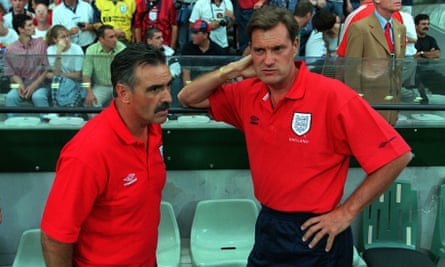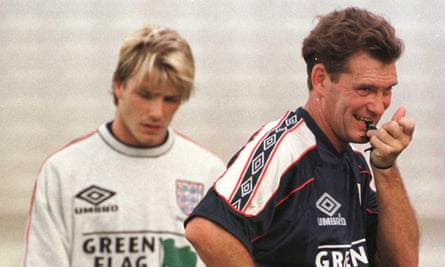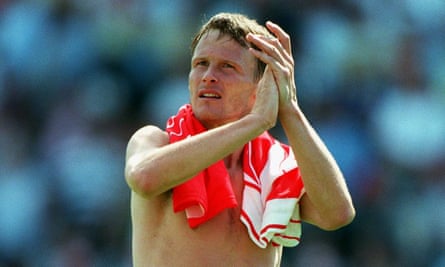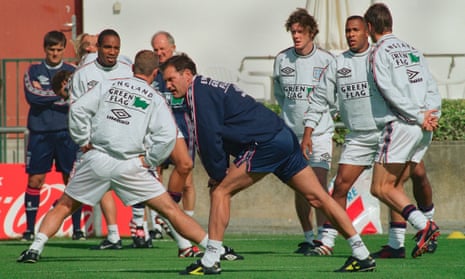The whispers about my man-management never went away. I was grateful when Steve McManaman issued a denial after a newspaper claimed that he had likened the camp to a cult, but I was surprised to hear that there was a feeling that I wanted to exert control because of my youth.
I was thinking about how to gain an edge. I used Dr Yann Rougier, a medic who had joined Arsène Wenger at Arsenal. He spoke to the players about how they digested food and it had a big effect on Tony Adams. They listened to him and it transformed them physically, making them better players.
Diet, sleep and fitness were important to me after my time with Arsène at Monaco. But I didn’t, for instance, have any say in an FA official stopping Gary Neville having a sandwich brought to his room one day. Why would I bother myself with that?
Footballers have a habit of reading a lot into their manager’s behaviour. I sometimes did it as a player, over-analysing small things. But as a manager my main concern was building a cohesive unit. Basic standards on the pitch mattered to me from a young age.
The beauty of managing England was that I didn’t have to do a lot of coaching on individual attributes. But they still had a responsibility to their talent. If they dropped their standards, I was ready to come down hard. It happened when I saw a couple of reserve players not paying attention during a drill on set pieces before a qualifying game. They were messing around and I picked them out, asking them to run me through our routines.
Maybe my response didn’t land well with them. But is that really bad management? Surely it’s good management. You have to be strong at times and there’s no excuse for not concentrating during training, particularly when a loss of focus could cause us to concede a silly goal from a set piece.
We were in France to win a World Cup. The idea that I wanted to show off by joining in during training isn’t true. I was reluctant when Johnny G [John Gorman] pushed me in to make up the numbers in a couple of small-sided games, but it was the only way to make the sessions work if a couple of players were carrying knocks.

Certain portrayals of me don’t correspond to reality. My critics also say I grew frustrated with players who weren’t as talented as me. My response is to point out that I started my managerial career at Swindon Town. I brought in a big centre-half, Shaun Taylor, and marvelled at his heading ability. I didn’t have everything in my locker as a player. I wasn’t a good header of the ball. Yet I understood players’ attributes.
When Arsène first spoke to me about going into management, he told me that I could reach players. “You can teach them because of your ability,” he said. “And you have patience with players, too.”
Arsène’s words hit home. I watched Shaun in training and loved his determination to win his headers. I couldn’t do that and I would never have dreamt of discarding someone just because they didn’t possess bags of skill.
My job was to find ways to capitalise on my team’s positive qualities. Tony Adams and Sol Campbell didn’t need me to coach them but they did benefit from my advice at times. It helped if I told them that they were giving away fouls in the air because their starting position was too deep.
My way was never to tell someone that they weren’t good enough or couldn’t pull off a certain skill. I encouraged my team to play with freedom.
It makes me laugh when I hear that I was jealous of David Beckham’s fame. This is a player I wanted to sign on loan at Chelsea. I gave him his England debut. David’s technique was incredible and I’ve never seen anyone cross the ball as well as him. His passing range was impeccable and I think that he could have played more in central midfield for club and country when he was older.

Going into our opening game against Tunisia, however, I could tell that David wasn’t focused enough in training. My decision to replace him with Darren Anderton caused a fuss but it was the right call. David would have played at right wing-back if his mind was clear but he was distracted by events off the pitch.
I was honest with David when I sat down with him. “I don’t think you’re focused,” I said. “I’m going to leave you out of this game. Your mind is somewhere else. I don’t know what it is, but you’ve got to get your mind right.” I looked him in the eye and made sure to give him some encouragement. “You will play at this World Cup,” I added. “You’re too good to leave out but I need you right at it.”
It jolted David. He wasn’t happy but his response was excellent. He was on it when we trained the next day. He hit a new level and showed me that it wouldn’t be a risk to play him in midfield with Incey [Paul Ince] further down the line.
The matter was over as far as I was concerned. But the press had other ideas. David was a huge name and his omission was a big story. It certainly didn’t go down well with Alex Ferguson – and I wasn’t exactly flavour of the month at Old Trafford. I had left out Phil Neville and had issues with another United player when I had to discipline Teddy Sheringham after he was pictured on a night out in the build-up to the tournament.

Dealing with United wasn’t easy. There were problems getting players to report for duty at times and I had a row with Ferguson over two of his players before one friendly. His conduct was unprofessional when we spoke on the phone. I wasn’t going to use the players but I wanted them to join up because we were preparing for the World Cup. But he wasn’t having it. He was ranting and raving, even when I said I would send them back once the meetings were out of the way. I can’t repeat what he called me. I just put the phone down.
He called back to apologise but he wasn’t happy. It all became a bit of a battle, and he used his Sunday Times column to criticise me when David and Gary Neville were put up at a press conference shortly after our win over Tunisia. Apparently it was insensitive after they’d been left out of the game. There was no big strategy on my part. I wasn’t trying to humiliate David. It was down to the press officers to select players and I gave the thumbs up when they suggested David. I knew the media wanted to speak to him and I thought it was a good idea to give them what they wanted on a quiet day, especially as David was guaranteed to play sooner rather than later.
This is an edited extract from Playmaker: My Life and the Love of Football by Glenn Hoddle, published by HarperCollins
